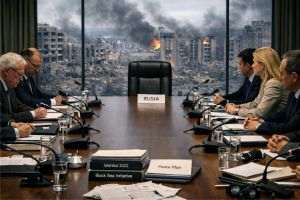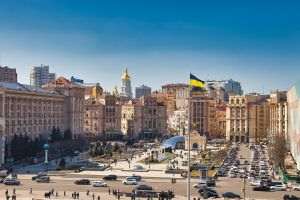The elections for the Capital City Mayor seem to have become an existential test for the current governing coalition, a sore point that could transform the relations between the PSD and the PNL into a minefield, according to yesterday's statements by Sorin Grindeanu, the interim president of the Social Democrats. We note that the position of general mayor of the Capital became vacant after Nicuşor Dan won the presidential elections in May 2025 and was inaugurated as president of the country.
Questioned by journalists, after the meeting of the PSD National Political Bureau, regarding a possible agreement between the PNL and the USR regarding the support of a common candidate for the position of general mayor of the Capital, Sorin Grindeanu replied: "It would mean that the PSD is in a form of isolation in this coalition, which, at least let's know how we stand. There are very high chances that the coalition will break up. I do not want to discuss the elections in Bucharest now, which at this moment have a very high potential to blow up the political scene".
In fact, the PSD leader warns that the stakes are much higher than a simple mayoral seat, and Bucharest could become the sword of Damocles for a government that claims its stability, but which risks collapsing under the pressure of its own contradictions. The idea of a joint PNL-USR candidate was floated by the former Minister of Transport, Cătălin Drulă, who expressed his intention to run on behalf of the main right-wing parties in the elections for the position of general mayor of Bucharest.
The fact that PSD leaders are already showing their frustration and talking openly about the possibility of the coalition breaking up shows that Bucharest is no longer just an electoral stake, but a battle for political survival. On the one hand, the Social Democrats are claiming their legitimacy through polls, with Sorin Grindeanu publicly congratulating Daniel Băluţă for his leading position in the preferences of Bucharest residents. This is a survey published on Sunday by CURS, according to which the PSD mayor of Sector 4, Daniel Băluţă, is the candidate best placed in voting intentions for the Capital City Hall with 24% of the respondents' voting intentions, followed by Cătălin Drulă (USR) with 20%, and in third place, tied with 11% each, are Ciprian Ciucu - the mayor of Sector 6 and Cristian Popescu Piedone, the former president of ANPC and former mayor of Sectors 4 and 5. The survey also includes journalist Anca Alexandrescu - 9%, Mihai Enache (AUR) - 6%, Diana Şoşoacă - 5%, former MEP Vlad Gheorghe - 3% and Ana Ciceală -3%. In the respective survey, 1100 respondents, over 18 years old, residents of Bucharest, who were questioned between August 12-22, 2025.
On the other hand, accepting a joint PNL-USR candidacy would be perceived as an affront and as a clear signal that PSD no longer counts in the coalition's major decisions. And in such a context, Grindeanu's warning that "there are very high chances" that the coalition will break up gains weight and turns the elections in the Capital into a time bomb.
Behind the speeches about reforms and stability, the reality is that the current government stands on a fragile balance. The legal deadline of 90 days for organizing partial local elections is already being questioned, with ambiguous explanations about the government's prerogatives and precedents invoked from other counties.
But the real problem is not the electoral calendar, but the lack of a real consensus between the partners. The PSD knows that any agreement made "in the offices” does not guarantee the automatic transfer of votes, and previous experiences have shown how volatile the capital's electorate is. That is why Grindeanu emphasizes that "moving votes is not that simple,” signaling that any artificial arrangement between parties risks being sanctioned at the polls.
Thus, Bucharest becomes not only the administrative capital, but also the capital of political risk, the place where the fate of the coalition is played out and where decisions will weigh more heavily than all the backstage negotiations so far. If the PSD is sidelined, the coalition risks turning into a simple conjunctural agreement, and in the event of a rupture, Romania could once again enter a cycle of political instability. For a government that promises reforms and stability, the capital proves to be the most unstable terrain, and the sword of Damocles hangs menacingly over an alliance that is trying to maintain its balance, but which could be shattered by the very fight for Bucharest.


















































